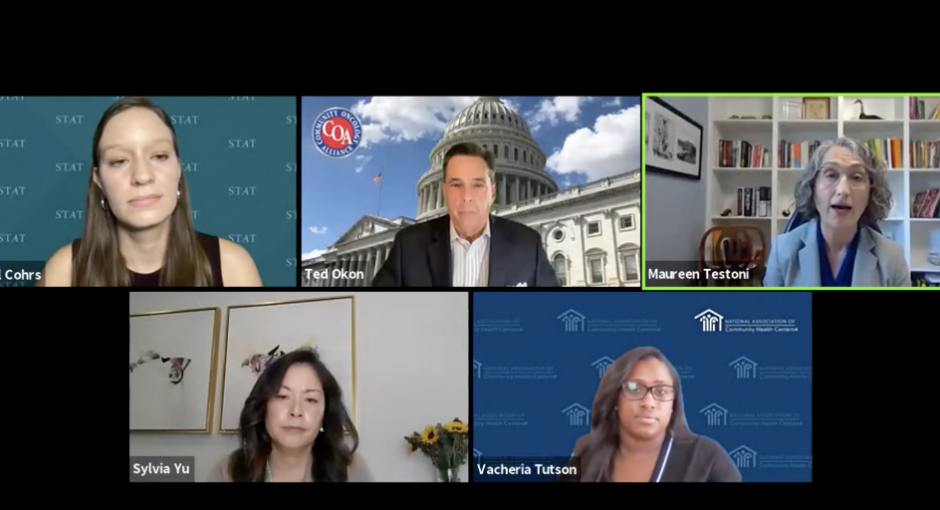Champions for safety-net health care providers on one side and drug manufacturers and oncologists in private practice on the other faced off yesterday during a health care news service’s webinar on the 340B program.
The hour-long Sept. 15 webinar was hosted by STAT. The first half was devoted to a Q&A on 340B with former U.S. Health and Human Services Department General Counsel Robert Charrow. The second was a panel discussion among:
- Ted Okon, executive director, Community Oncology Alliance
- Maureen Testoni, president and chief executive officer, 340B Health
- Vacheria Tutson, director, regulatory affairs, National Association of Community Health Centers
- Sylvia Yu, senior counsel for federal programs, PhRMA
STAT Washington correspondent Rachel Cohrs led the discussion. COA and 340B Health set the tone by each releasing a report in advance of the event. COA’s slammed “so-called non-profit” 340B hospitals for charging commercial payers and uninsured patients “extraordinarily high prices” for oncology drugs. 340B Health’s report slammed insulin and diabetes drug manufacturers for violating the 340B statute through their contract pharmacy actions and profiting off the backs of people with diabetes and the safety-net providers who care for them.
During yesterday’s event, the divisions between the two camps was on full display from the very first question about the 340B program’s purpose.
Tutson and Testoni emphasized how 340B stretches health centers and hospitals’ scarce resources, enabling them to “help patients in many ways” beyond “helping them with affordable drugs,” as Testoni put it. Tutson pointed out that, by law and regulation, health centers must “reinvest every penny that we have and generate savings back into medical care.” Testoni said hospitals “are required by law to report every dime they take in and every dime they spend.”
Yu said 340B’s purpose is to let covered entities “have access to affordable medicines that should be used to help low-income patients.” She said the program “was really created to help vulnerable patients” but “it’s less and less clear that patients are benefitting.” 340B is now the second biggest federal prescription drug program behind Medicare Part D, Yu said, “but with that growth we haven’t seen the same level of growth in terms of care for vulnerable patients.”
Okon said 340B discounts “went originally to a handful of safety net providers” but has “mutated into a program that’s unrecognizable.” He said accountability for how 340B savings are used “doesn’t exist on the hospital side and frankly it’s a black hole.”
Cohrs asked the panelists what kind of solution to 340B’s problems would they like to see from the Biden administration.
Tutson said it is “really important” to health centers for the administration to get the 340B administrative dispute resolution (ADR) process “up and running” so centers can have their claims heard about manufacturers’ denials of and conditions on 340B pricing when centers use contract pharmacies.
Yu said, “steps could be taken to increase the transparency and accountability in this program.”
“There was some federal legislation that had been introduced a couple of years ago that would have required or imposed reporting requirements” on hospitals “so we could really see are the discounts are being used” at the parent hospital and child site levels, she said. “Right now, we don’t have a requirement that the discounts help the patients,” Yu added. “This is a safety net program. Shouldn’t it be helping patients with their drug costs?”
“What should happen on the hospital side is the discount should go to the patients in need,” Okon said. “I shouldn’t have to read another story about big hospitals that aggressively debt collected, and then you look up and see that they’re a 340B hospital,” he added.
“I really think it’s time for HHS to impose civil monetary penalties on the manufacturers” refusing 340B discounts under contract pharmacy, Testoni said.


